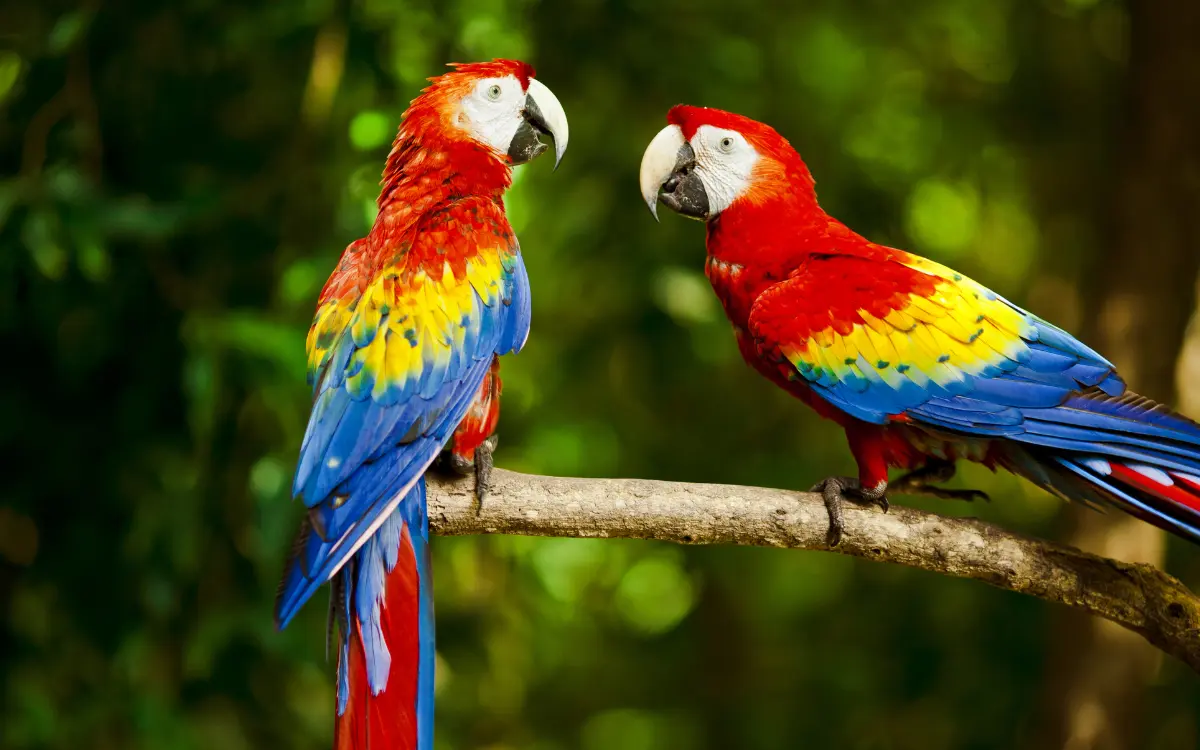Macaws are one the most colorful birds that live long also.
Most of the people make this macaws as a pets because they are good companion also they can mimic human .
Today you’re going to see everything that makes your pest more careful and make good habits.
Choosing the Right Macaw
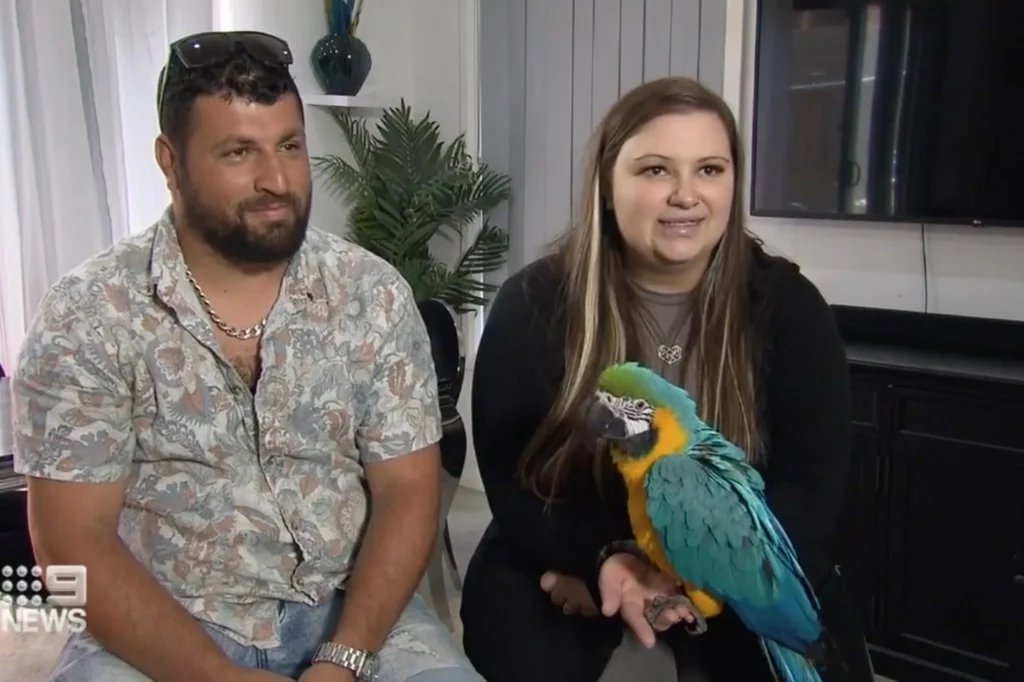
When choosing a macaw, it’s essential to understand the different species available, each with its unique characteristics, care needs, and personality traits. Here’s an overview of some popular macaw species to help you make an informed decision.
Selecting the perfect macaw companion is a crucial first step for potential owners. Each species has unique characteristics, personalities, and care requirements. Here’s an overview of four popular macaw species:
1.Blue and Gold Macaw:
- Size: Large, about 30-36 inches long
- Personality: Generally friendly and sociable
- Noise level: Moderate to high
- Talking ability: Excellent
- Lifespan: 50-60 years in captivity
2.Scarlet Macaw:
- Size: Large, about 32-39 inches long
- Personality: Intelligent and playful, can be temperamental
- Noise level: Very high
- Talking ability: Good
- Lifespan: Up to 50 years in captivity
3.Green-winged Macaw:
- Size: One of the largest, about 35-40 inches long
- Personality: Gentle giants, affectionate
- Noise level: High
- Talking ability: Good
- Lifespan: 50-60 years in captivity
4.Hyacinth Macaw:
- Size: Largest parrot species, about 40 inches long
- Personality: Gentle, playful, and intelligent
- Noise level: Relatively quieter than other macaws
- Talking ability: Moderate
- Lifespan: Up to 50 years in captivity
Housing Requirements
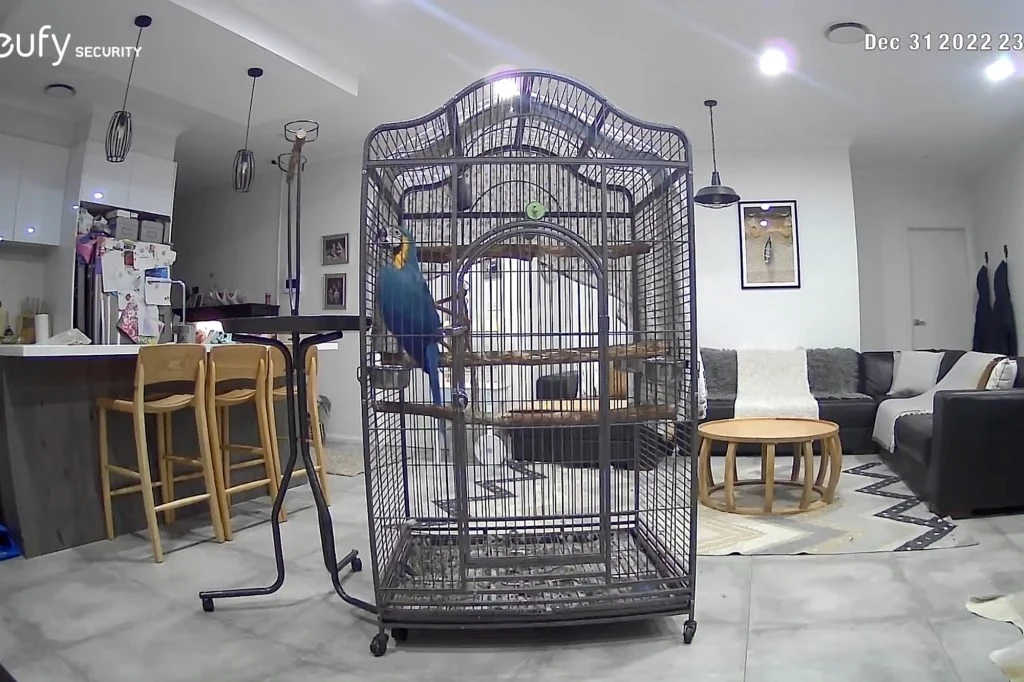
Proper housing is crucial for a macaw’s health and happiness. Here’s what you need to know:
Cage size and specifications:
- Minimum size: 36″ W x 24″ D x 48″ H for smaller species, larger for big macaws
- Bar spacing: 0.75″ to 1″ to prevent escape and injury
- Material: Sturdy, non-toxic metals like stainless steel or powder-coated steel
- Shape: Rectangular cages are better than round ones
- Door: Large enough for easy access and to accommodate toys
Outdoor aviaries:
- Size: As large as possible, minimum 8′ x 8′ x 8′
- Construction: Strong wire mesh, double-door entry system
- Protection: Shelter from rain, wind, and direct sunlight
- Predator-proof: Secure from ground and aerial predators
- Enrichment: Include natural branches, swings, and foraging opportunities
Perches and accessories:
- Various perch types: Natural branches, rope perches, cement perches
- Different diameters: To exercise feet and prevent foot problems
- Positioning: Place perches at different heights
- Food and water bowls: Sturdy, easy to clean, placed away from perches
- Toys: Rotate regularly to prevent boredom
Safety considerations:
- No toxic materials: Avoid zinc, lead, or treated woods
- Escape-proof: Secure locks on doors and food hatches
- No sharp edges: Check for potential injury points
- Placement: Away from drafts, direct sunlight, and kitchen fumes
- Supervision: Always monitor out-of-cage time
- Bird-safe room: Remove hazards like electrical cords, toxic plants, and small objects
Remember, the goal is to create a spacious, stimulating, and safe environment that mimics a macaw’s natural habitat as much as possible.
Diet and Nutrition
A proper diet is essential for your macaw’s health, longevity, and happiness. Here’s a comprehensive guide:
Balanced diet composition:
- 70-80% high-quality commercial pellets formulated for macaws
- 20-30% fresh fruits and vegetables
- Occasional nuts and seeds as treats (no more than 10% of diet)
Fresh foods list:
- Vegetables: Carrots, sweet potatoes, leafy greens, bell peppers, broccoli, squash
- Fruits: Apples (no seeds), berries, melons, papaya, mango, banana
- Grains: Cooked brown rice, quinoa, whole grain pasta
- Proteins: Cooked lean meats, eggs (cooked), legumes
Foods to avoid:
- Avocado (toxic to birds)
- Chocolate
- Caffeine
- Alcohol
- Salty or sugary human foods
- Onions and garlic
- Raw beans
- Fruit seeds and pits (especially apple and stone fruits)
Feeding schedule:
- Offer fresh pellets daily
- Provide fresh fruits and vegetables twice daily
- Remove uneaten fresh foods after a few hours to prevent spoilage
- Treats should be given sparingly, not as a regular part of the diet
Water requirements:
- Always provide clean, fresh water
- Change water at least twice daily
- Use a heavy ceramic bowl to prevent tipping
- Consider a water bottle in addition to a bowl
- Clean water containers thoroughly daily
Additional tips:
- Introduce new foods gradually
- Chop fruits and vegetables into manageable pieces
- Offer a variety of colors and textures to encourage foraging behavior
- Consult with an avian veterinarian for specific dietary recommendations
- Monitor your macaw’s weight and adjust diet as needed
- Provide calcium sources like cuttlebone or mineral blocks
Remember, a varied and balanced diet is key to your macaw’s overall health and well-being. Always consult with an avian vet if you have concerns about your bird’s diet or nutritional needs.
Health and Hygiene
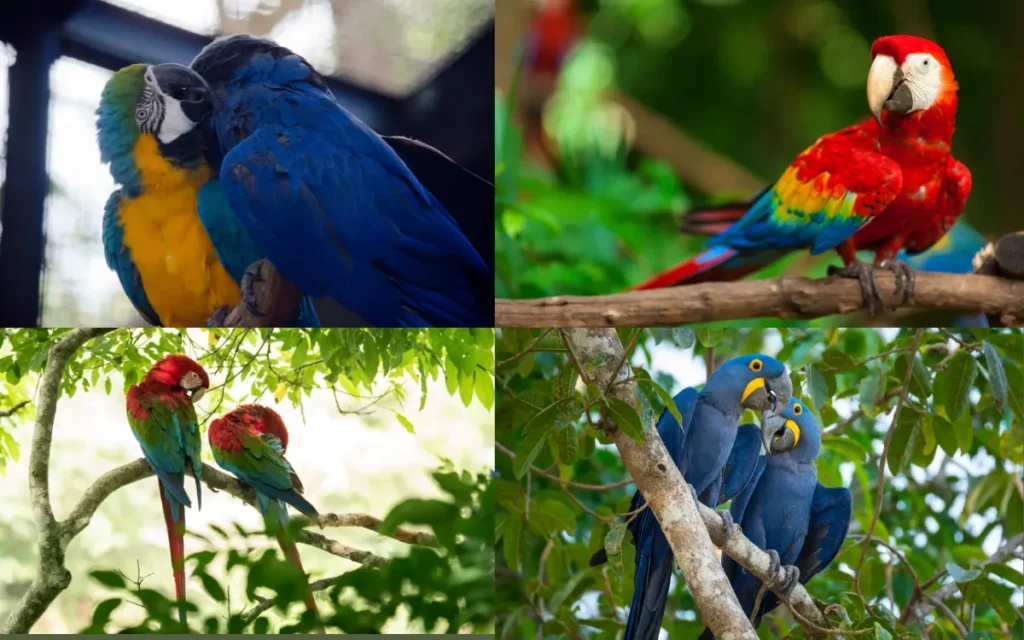
Maintaining your macaw’s health and hygiene is crucial for its well-being. Here’s a comprehensive guide:
Common health issues:
- Psittacosis (parrot fever)
- Respiratory infections
- Beak and feather disease
- Aspergillosis (fungal infection)
- Nutritional deficiencies
- Egg binding in females
- Feather plucking due to stress or boredom
Signs of illness:
- Changes in appetite or water consumption
- Lethargy or decreased activity
- Ruffled or puffed up feathers
- Discharge from eyes or nostrils
- Changes in droppings (color, consistency, frequency)
- Difficulty breathing or tail bobbing
- Swollen eyes or face
- Limping or favoring a leg
Regular health checks:
- Daily observation of behavior and droppings
- Weekly weighing to monitor for changes
- Monthly physical examination (beak, feet, feathers, skin)
- Annual check-up with an avian veterinarian
Grooming needs:
- Bathing: Offer a shallow dish of water or mist with lukewarm water 2-3 times a week
- Nail trimming: As needed, typically every few months
- Beak trimming: Usually done by a vet if overgrown
- Wing clipping: Discuss with your vet if necessary for safety
- Preening: Provide opportunities for natural preening and molting
Finding an avian veterinarian:
- Search for certified avian specialists in your area
- Ask local bird clubs or pet stores for recommendations
- Check with the Association of Avian Veterinarians
- Ensure the vet has experience with macaws specifically
- Schedule a initial visit to assess the vet’s knowledge and facility
Additional tips:
- Keep a first aid kit on hand for emergencies
- Learn basic bird first aid techniques
- Maintain a clean environment to prevent infections
- Quarantine new birds before introducing them to your macaw
- Keep detailed records of your macaw’s health and behavior
Remember, prevention is key in maintaining your macaw’s health. Regular check-ups, a proper diet, and a clean environment can help prevent many common health issues. Always consult with your avian veterinarian if you notice any changes in your macaw’s behavior or appearance.
Exercise and Enrichment

Keeping your macaw physically active and mentally stimulated is crucial for its overall well-being.
Here’s a comprehensive guide:
Out-of-cage time:
- Minimum 2-3 hours daily, more if possible
- Supervise at all times to ensure safety
- Gradually increase time as your macaw becomes comfortable
- Establish a routine for consistency
Safe play areas:
- Bird-proof room with closed windows and doors
- Remove toxic plants, electrical cords, and small objects
- Provide a play stand or gym with various perches and toys
- Consider a ceiling-mounted play area for extra space
- Ensure the area is free from drafts and temperature extremes
Toys and activities:
- Foraging toys to encourage natural behaviors
- Puzzle toys to challenge problem-solving skills
- Chewing toys for beak exercise (wood, coconut, leather)
- Swings and ladders for physical activity
- Mirrors (use cautiously to avoid over-attachment)
- Rotate toys regularly to maintain interest
Mental stimulation:
- Training sessions (trick training, target training)
- Hide treats in toys or around the play area
- Introduce new objects or rearrange play area regularly
- Provide opportunities for bathing and water play
- Offer a variety of textures and materials to explore
- Use food puzzles to make eating more challenging and engaging
Additional tips:
- Encourage flying or wing-flapping exercises if safe
- Provide opportunities for climbing and hanging
- Offer different types of perches to exercise feet
- Engage in interactive play with your macaw
- Consider clicker training for mental stimulation
- Provide a variety of sounds and music
- Allow supervised outdoor time in a secure carrier or harness
Remember, a bored macaw can develop behavioral issues like feather plucking or excessive screaming. Regular exercise and enrichment are essential for maintaining your macaw’s physical and mental health. Always prioritize safety and supervise your macaw during out-of-cage time and play sessions.
Training and Socialization
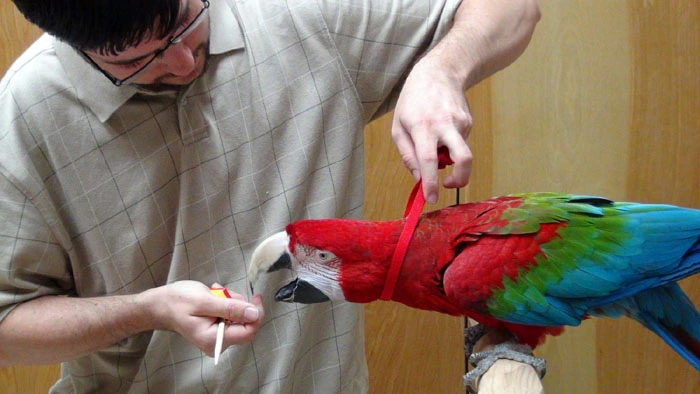
Proper training and socialization are crucial for a well-adjusted, happy macaw. Here’s a comprehensive guide:
- Basic training techniques:
- Start with simple commands like “step up” and “step down”
- Use consistent verbal cues and hand signals
- Keep training sessions short (5-15 minutes) and frequent
- Always end on a positive note
- Be patient and persistent – learning takes time
Positive reinforcement methods:
- Use treats, praise, or favorite toys as rewards
- Clicker training can be very effective
- Never punish or use negative reinforcement
- Ignore unwanted behaviors and reward desired ones
- Gradually phase out treats as behaviors become established
Social needs:
- Macaws are highly social and need daily interaction
- Spend at least 2-3 hours per day interacting with your macaw
- Provide a variety of social experiences (talking, playing, cuddling)
- Include your macaw in family activities when possible
- Consider getting a companion bird if you can’t provide enough attention
Interaction with family members and other pets:
- Introduce new people slowly and positively
- Teach children how to interact safely and respectfully
- Supervise all interactions between macaws and other pets
- Never leave your macaw alone with other animals
- Be aware of your macaw’s body language to prevent stress or aggression
Additional tips:
- Start socialization early, but it’s never too late to begin
- Expose your macaw to various sights, sounds, and experiences
- Use a harness for safe outdoor experiences
- Join a bird club or attend bird shows for socialization opportunities
- Consider trick training for mental stimulation and bonding
- Be consistent with rules and boundaries across all family members
- Address any signs of aggression or fear promptly with professional help
Remember, macaws are intelligent and sensitive creatures. Building a strong, positive relationship through proper training and socialization will lead to a happier, well-adjusted bird. Always prioritize your macaw’s comfort and safety in social situations, and never force interactions if your bird shows signs of stress or discomfort.
Environmental Needs
Creating the right environment is crucial for your macaw’s health and comfort. Here’s a comprehensive guide to their environmental needs:
Temperature and humidity:
- Ideal temperature range: 65-80°F (18-27°C)
- Avoid sudden temperature changes
- Keep away from drafts, air conditioning vents, and heaters
- Optimal humidity: 50-70%
- Use a hygrometer to monitor humidity levels
- If too dry, use a humidifier or mist the area (not directly on the bird)
- Provide a shallow bath for self-regulation of humidity
Lighting requirements:
- Exposure to natural sunlight is best (through a window, not direct)
- 10-12 hours of light per day
- Use full-spectrum UV lights if natural light is limited
- Ensure 10-12 hours of darkness for proper sleep
- Gradually adjust lighting to mimic natural seasonal changes
- Replace UV bulbs every 6-12 months as effectiveness decreases over time
Air quality:
- Ensure good ventilation without drafts
- Avoid smoking or using aerosols near your macaw
- Keep the area free from cooking fumes and strong odors
- Use bird-safe, non-toxic cleaning products
- Consider an air purifier to remove dust and dander
- Regularly clean and vacuum to minimize airborne particles
- Avoid scented candles, essential oils, or air fresheners
Additional considerations:
- Position the cage or play area away from windows to avoid temperature fluctuations
- Provide a covered area or “sleep cage” for nighttime
- Monitor for signs of overheating (panting, wings held away from body) or chilling (fluffed feathers)
- Be cautious with ceiling fans – ensure they’re off when the macaw is out of the cage
- Consider seasonal adjustments, especially in extreme climates
- Regularly check carbon monoxide and smoke detectors
Remember, macaws are native to tropical environments, so aim to recreate these conditions as closely as possible in captivity. Always observe your macaw’s behavior for signs of discomfort and adjust the environment accordingly. Consult with an avian veterinarian if you have concerns about your macaw’s environmental needs.
Behavior Understanding
Understanding your macaw’s behavior is key to a strong bond and proper care. Here’s a guide to help you interpret and respond to your macaw’s communication:
Body language:
- Relaxed: Wings relaxed, feathers smooth, eyes calm
- Alert: Head up, eyes wide, crest slightly raised
- Excited: Pupils dilating and constricting rapidly, tail fanned out
- Aggressive: Crest fully raised, beak open, leaning forward
- Fearful: Crouching, feathers slicked down, eyes pinning
- Playful: Head bobbing, swaying side to side, hanging upside down
- Tired: Sleepy eyes, feathers fluffed, beak grinding
Vocalizations and their meanings:
- Loud squawks: Alarm, excitement, or demand for attention
- Soft chirps: Contentment or seeking interaction
- Growling: Warning or displeasure
- Whistling: Happy or playful mood
- “Talking” or mimicking: Social interaction or seeking attention
- Clicking sounds: Often a sign of contentment
- Screaming: Attention-seeking, boredom, or distress
Dealing with common behavioral issues:
1. Excessive screaming
- Identify and address the cause (boredom, attention-seeking)
- Provide more enrichment and interaction
- Ignore screaming and reward quiet behavior
2. Biting
- Understand triggers (fear, territoriality)
- Use positive reinforcement for gentle behavior
- Avoid punishing; it can increase aggression
3. Feather plucking
- Rule out medical causes with a vet check
- Reduce stress and provide more enrichment
- Consider environmental changes
4. Territoriality
- Respect the bird’s space
- Use neutral areas for interaction
- Gradually desensitize to handling in different areas
5. Fear or phobias
- Identify triggers
- Use gradual exposure and positive associations
- Never force interaction with feared objects/situations
6. Bonding to one person
- Encourage positive interactions with other family members
- Use group activities to socialize
Additional tips:
- Observe your macaw daily to understand its normal behavior
- Keep a behavior journal to track changes or issues
- Consistency is key in addressing behavioral problems
- Seek professional help for persistent or severe issues
- Remember that some behaviors are natural for macaws and can’t be entirely eliminated
Understanding your macaw’s behavior takes time and patience. Always approach behavioral issues with compassion and remember that your macaw is communicating its needs or feelings. If you’re unsure about a behavior or how to address it, consult with an avian behaviorist or experienced veterinarian.
Legal Considerations
Understanding the legal aspects of owning a macaw is crucial for responsible ownership. Here’s an overview of key legal considerations:
Permits and regulations:
- Check local laws: Some cities or states may have restrictions on exotic pet ownership
- Federal regulations: In the US, the Migratory Bird Treaty Act protects native species
- CITES (Convention on International Trade in Endangered Species):
– Regulates international trade of endangered species
– Macaws may require CITES documentation for legal ownership
- Proof of legal acquisition: Keep purchase documents and breeder information
- Registration: Some areas require exotic pets to be registered with local authorities
- Noise ordinances: Be aware of local laws regarding noise, as macaws can be loud
Travel restrictions:
Domestic travel:
- – Airlines have varying policies on traveling with birds
- – Health certificates from a vet are often required
- – Proper carrier requirements must be met
International travel:
- – Many countries have strict regulations on importing exotic pets
- – Quarantine periods may be required
- – CITES permits are necessary for crossing international borders
State-to-state travel:
- – Some states have specific entry requirements for birds
- – Health certificates may be needed when crossing state lines
Additional considerations:
- Liability: Consider exotic pet insurance to cover potential damages or injuries
- Zoning laws: Ensure your property is zoned for exotic pet ownership
- Future regulations: Stay informed about potential changes in exotic pet laws
- Estate planning: Make provisions for your macaw’s care in case of owner incapacitation or death
- Ethical sourcing: Ensure your macaw was legally bred in captivity, not wild-caught
Remember:
- Laws and regulations can vary significantly by location and may change over time
- Always research current laws before acquiring a macaw or traveling with one
- Consult with local wildlife authorities or an exotic pet lawyer for specific legal advice
- Responsible ownership includes complying with all relevant laws and regulations
Being aware of and complying with these legal considerations will help ensure a positive experience for both you and your macaw, while also contributing to the ethical treatment and conservation of these beautiful birds.
Read also: 13 Intelligent Pet Birds for Owners
FAQs
Are macaws high maintenance?
Yes, macaws are high-maintenance pets requiring extensive time, attention, and resources for proper care.
Where not to touch a macaw?
Avoid touching a macaw’s vent area, under the wings, and tail feathers without proper training and trust.
What is the biggest threat to macaws?
The biggest threat to wild macaws is habitat loss due to deforestation and illegal pet trade.
What is the enemy of a macaw?
In the wild, macaws’ main enemies are large birds of prey, snakes, and some mammals; in captivity, improper care is their biggest threat.

